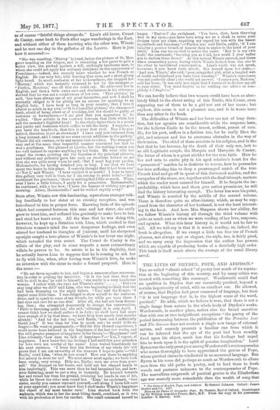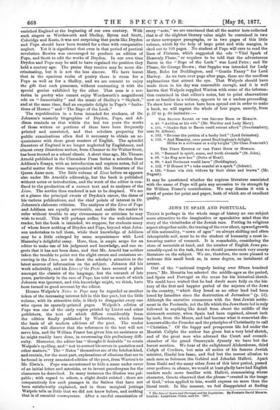THE LIVES OF DRYDEN, POPE, AND ADDISON.* THE so-called "classic
school" of poetry lost much of its reputa- tion at the beginning of this century, and by many critics was. treated with something like contempt. Wordsworth could find no qualities in Dryden that are essentially poetical, beyond a certain impetuosity of mind, with an excellent ear. He allowed, of course, that Dryden had great command of language, but theh "it is not language that is, in the highest sense of the word, poetical." He adds, which we believe is true, that there is not a single image from nature in the whole body of Dryden's works. Wordsworth, in another place, makes also the broad assertion that with one or two insignificant exceptions "the poetry of the intervening between the publication of the Paradise Lost and The Seasons does not contain a single new image of external nature, and scarcely presents a familiar one from which it- can be inferred that the eye of the poet had been steadily fixed upon his object, much less that his feelings had urged him to work upon it in the spirit of genuine imagination." Lord Byron was the only great poet among Wordsworth's contemporaries who seems thoroughly to have appreciated the genius of Pope, whose poetical claims he vindicated in no measured language. But Byron in his verse did perhaps as much as Wordsworth to allure men from the old paths in poetry, and to lead them to fresh woods and pastures unknown to the contemporaries of Pope.. The marvellous outgrowth of poetical genius in the Elizabethas age was scarcely more remarkable than the wealth of song that • The Lira of Dryden, Pope, and Addison. By Samuel Johnson. Oxford: James Parker and Co. 1877. Rota on the Poems of Alexander Pope. By Horatio, Earl of Oxford. Contributed by Sir William Augustus Fraser, Bart., M.P. From the copy in his pommels's- London: F. Harvey. 1876. enriched England at the beginning of our own century. With such singers as Wordsworth and Shelley, Byron and Scott, -Coleridge and Keats, it was not surprising that poets like Dryden and Pope should have been treated for a time with comparative megleet. Yet it is significant that even in that period of poetical revolution Bowles was encouraged to produce an edition of Pope, and Scott to edit the works of Dryden. In our own time Dryden and Pope may be said to have regained the position they held a century ago. The praise they receive may be more dis- criminating, but it is not the less sincere. We have learnt that in the spacious realm of poetry there is room for a Pope as well as for a Shelley, and we are content to enjoy the gift that each possesses, without contrasting it with the special genius exhibited by the other. That man is a sec- tarian in poetry who cannot enjoy Wordsworth's magnificent ode on " Immortality " and the music of Shelley's " Skylark," and at the same time, find an exquisite delight in Pope's "Imita- tions of Horace" and "The Rape of the Lock."
The republication in a form intended for students, of Dr. Johnson's masterly biographies of Dryden, Pope, and Ad- dison reminds us that within the last ten years the works of these writers or portions of them have been frequently printed and annotated, and that scholars preparing for public examinations often find it necessary to obtain an ac- quaintance with these great masters of English. The splendid literature of England is no longer neglected by Englishmen, and almost every illustrious author, from Chaucer to Sir Walter Scott, has been treated as a school classic. A short time ago, Mr. Thomas Arnold published in the Clarendon Press Series a selection from Addison's Essays, with an introduction and copious notes, full of awful matter for those unacquainted with the literature of the Queen Anne men. The little volume of Lives before us appears also under Mr. Arnold's editorship, but the book is published without notes or introduction, and the work of the editor is con- fined to the production of a correct text and to analyses of the Lives. The service thus rendered is not to be despised. We see at a glance the principal events of Dryden's career, the dates of his various publications, and the chief points of interest in Dr. Johnson's elaborate criticism. The analyses of the Lives of Pope and Addison are equally serviceable, and enable the reader to -refer without trouble to any circumstance or criticism he may wish to recall. This will perhaps suffice for the well-informed reader, but the book is intended, we suppose, for students many of whom know nothing of Dryden and Pope, beyond what John- son undertakes to tell them, while their knowledge of Addison may be a little enlarged by some acquaintance with Lord Macaulay's delightful essay. Here, then, is ample scope for an editor to make use of his judgment and knowledge, and one re- grets that it has not been done, and that Mr. Arnold has neither taken the trouble to point out the slight errors and omissions oc- curring in the Lives, nor to draw the scholar's attention to the latest sources of information on the subject. Johnson did his work admirably, and his Lives of the Poets have secured a place amongst the classics of the language, but the research of late years, particularly in the case of Pope, has told us much of which Johnson was ignorant, and this knowledge might, we think, have been turned to good account by the editor.
Horace Walpole's Notes to Pope may be regarded as another token of the increasing interest felt in this fine poet, but the little volume, with its attractive title, is likely to disappoint every one who opens its sparsely-printed pages. Walpole's edition of Pope was one • of the early copies printed by Lintot and other publishers, the text of which differs considerably from the edition finally published by Warburton, which forms the basis of all modern editions of the poet. The reader therefore will discover that the references to the text will not serve him, and Sir William Fraser has given him no assistance as he might readily have done, in overcoming this preliminary diffi- culty. Moreover, the editor has "thought it desirable" to retain Walpole's spelling, and" not to correct his errors in quotation and other matters." The "Notes "themselves are of the briefest kind, and contain, for the most part, explanations of allusions that are to be found in every annotated edition of the poet, from Warton's to Mr. Elwin's. Pope was accustomed to hide a name under cover of an initial letter and asterisks, or to invent pseudonyms for the characters he described. In many instances the illusion was pal- pable; with regard to others, a slight doubt existed ; there are comparatively few such passages in the Satires that have not been satisfactorily explained, and in these marginal jottings Walpole tells us little that we did not know before, and nothing that is of essential consequence. After a careful examination of
every "note," we are convinced that all the matter here collected that is of the slightest literary value might be contained in two or three newspaper paragraphs, or in two pages of this little volume, which by the help of large print and wide margins, is eked out to 109 pages. No student of Pope will care to read the lines of Flatman, which suggested the ode "Vital Spark of Heavenly Flame," or requires to be told that the adventurous Baron in the "Rape of the Lock" was Lord Petre ; and Sir Plume, Sir George Brown ; that Sappho was intended for Lady Mary, Bubo for Doddington, and "Gentle Fanny" for Lord Harvey. As we turn over page after page, these are the needless explanations that attract the eye. That Walpole should have made them in his day was reasonable enough, and it is well known that Walpole supplied Warton with some of the informa- tion contained in that editor's notes, but to print observations now so familiar in a volume, appears to us a useless proceeding. To show how these notes have been spread out in order to make a book, we will reprint the whole of four pages, namely, from p. 57 to p. 60 inclusive :—
THE SECOND SATIRE OF THE SECOND BOOK OF HORACE. v. 49. " Avidien or his wife" (Mr. Wortley and Lady Mary).
v. 181. "Shades that to Bacon could retreat afford" (Gourhambtu7, near St. Albans).
v. 182. "Become the portion of a booby lord" (Lord Grimston).
v. 183. "And Hemsley, once proud Buckingham's delight, Slides to a scrivener or a city knight "(Sir Chas. Daucomb ) THE FIRST EPISTLE OF TUE FIRST BOOK OF HORACE.
v. 85. "Barnard in spirit, sense, and truth abounds " (St. John).
v.88. "As Bag now has" (Duke of Kent).
v. 88. "And Dorimant would have" (Doddington).
v. 112. "If Honest S* z take scandal at a spark" (Schutz).
v. 131. "Some win rich widows by their chine and brawn" (Mr.
Nugent).
It may be questioned whether the copious literature associated with the name of Pope will gain any accession to its strength by Sir William Fraser's contribution. We may dismiss it with a word of praise for print and paper, both of which are of excellent quality.



































 Previous page
Previous page